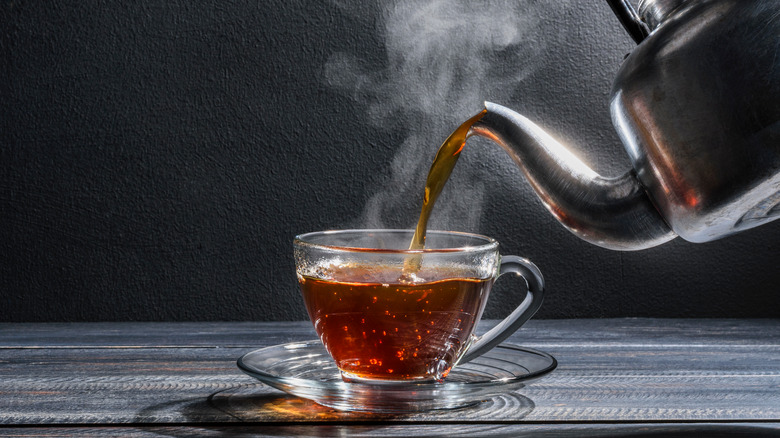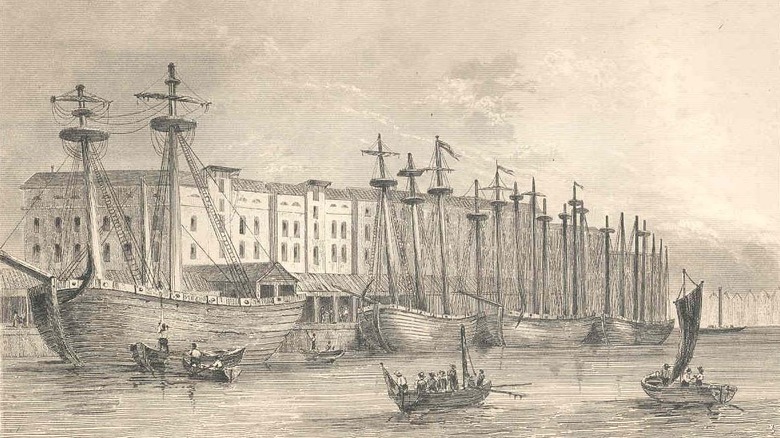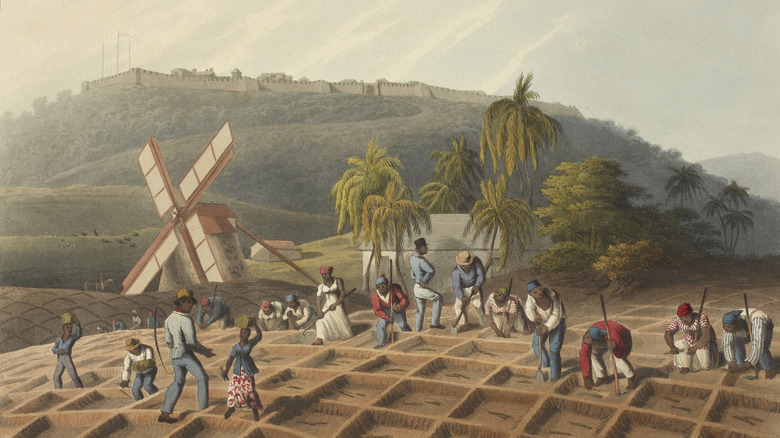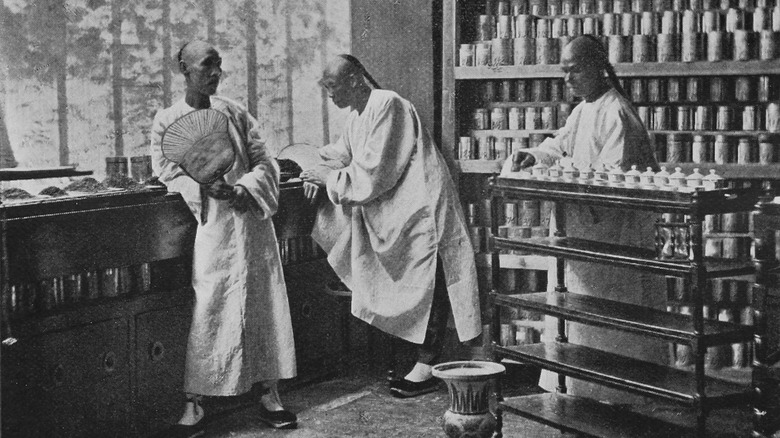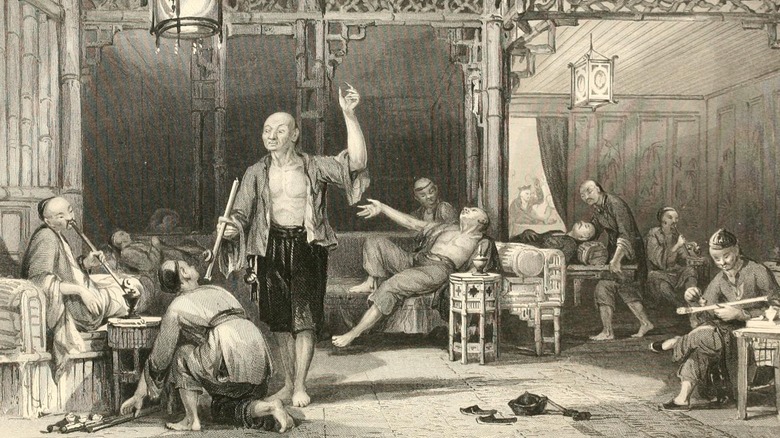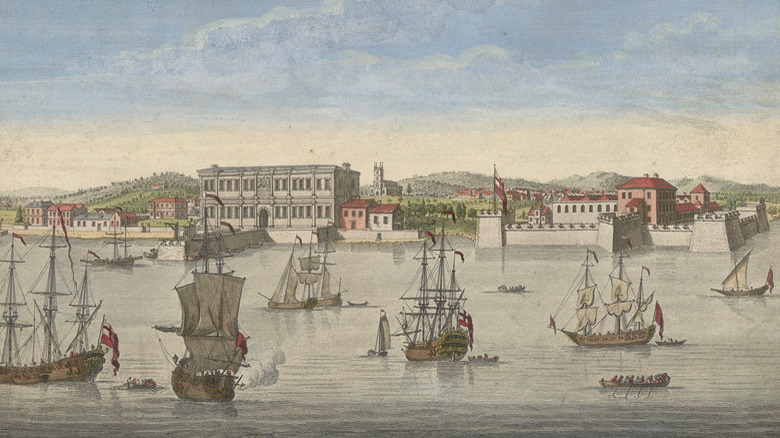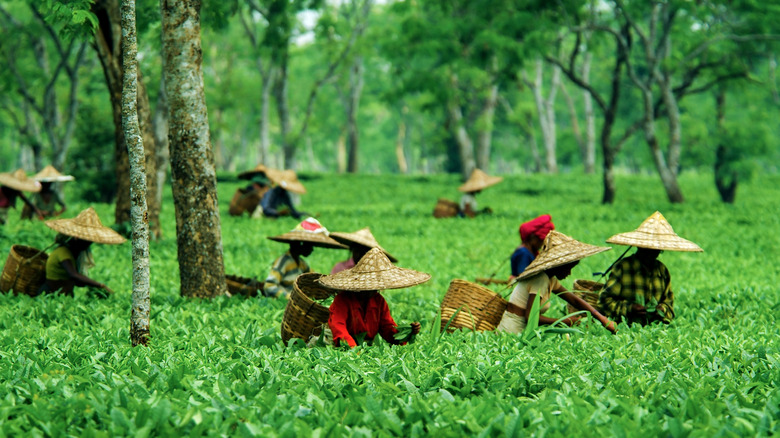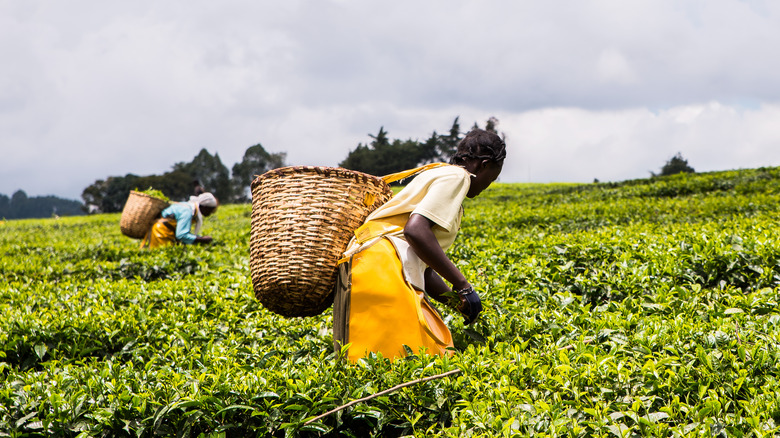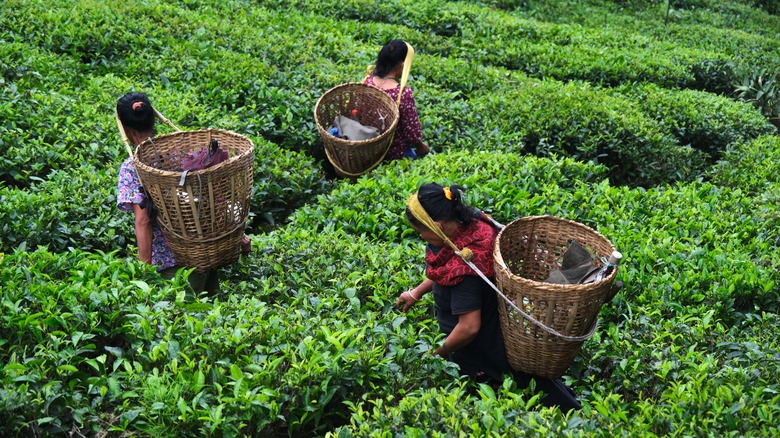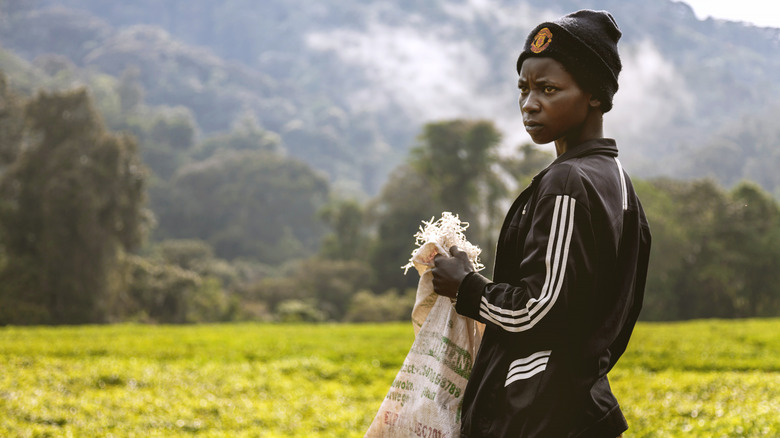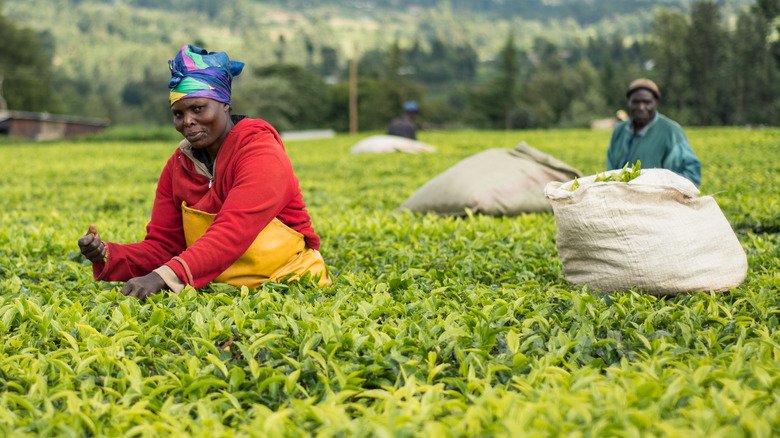Dark Secrets Of The Tea Industry
Tea is the world's favorite drink. National Geographic notes that tea is the most widely consumed beverage in the world (not including water), and people on Earth collectively drink around 6 billion cups every day. The widespread popularity of tea is largely thanks to it having been part of day-to-day life for a long time. First brewed in China around 4,700 years ago, tea has an ancient history. In the modern world, tea has spread around the globe and is produced in a variety of locations, including Argentina and Japan, per the UN Food and Agriculture Organization. But with a long history comes plenty of uncomfortable secrets, and the modern tea industry has several.
In 2022, a group of Kenyans took steps to sue the British government over colonial abuses involved in setting up tea plantations in their country. Per AJ+, they hope to claim up to $200 billion in damages for the violent relocation of indigenous people. Reuters elaborates on what the Kenyan group describes as "colonial-era land theft" and the gross violations of human rights that accompanied it, including torture and slaughter. The sad part is that this is just one example of wealthy organizations exploiting people, which they have done for centuries and continue to do. In this case, it's all in the name of a drink. Behind the colorful boxes and plastic bottles of tea that line supermarket shelves lies an industry with a dark history.
Tea made the East India Company wealthy
The British East India Company is practically synonymous with European imperialism. As Britannica mentions, the company was formed in the year 1600 with the sole purpose of exploiting trade with South and East Asia (coinciding with the rise of modern capitalism). According to the World Green Tea Association, the British East India Company was a militaristic organization motivated by tax money and backed by a large standing army. One of their most-demanded trade goods was tea, and as the amount of imported tea skyrocketed, so too did their profits.
A podcast from BBC Radio 4 mentions that by 1801, the East India Company was earning 24 million pounds a year from the tea trade, which works out to about $1.4 billion in modern currency. Despite the huge profits (especially at a time when the average family earned the equivalent of $36 annually), the British Empire itself was in debt. With tea one of its most significant trade goods, the British government increased taxes in hopes of covering its debt — ultimately leading to the Boston Tea Party and the American Revolution (via History.com).
The legacy of imperialism still hangs over the world. Surprisingly, while the British East India Company is most often mentioned as part of history, it was relaunched in 2010, per BBC.
The tea trade catalyzed British colonialism
It became popular to sweeten tea with cane sugar, which had long been consumed in the elite corners of British society. The two goods, traded as luxuries, would both become big motivators for British colonialism. As NPR explains, profits gained from tea and sugar trade supported the British Navy, which set sail to colonize new land, construct more plantations, and further expand one of the darkest parts of recent history: the transatlantic slave trade. Al Jazeera notes that at one point, tea taxes accounted for 10% of the British government's income.
Colonial tea plantations in British India and elsewhere were notorious for their terrible working conditions. Unfortunately, many people in Britain didn't care, per The New York Times. Even worse, as an article in Smithsonian Magazine mentions, some people even romanticized the plantations. There are still surviving colonial artifacts, like tea boxes, with artwork showing enslaved workers on plantations. However, this endorsement of exploitation was not universal. While many were carelessly sipping their sugary tea, there was also an abolitionist movement at work trying to raise awareness of the plight of the enslaved workers.
The British stole tea from China
China is the cultural home of tea and, for a long time, the country held a monopoly on the tea trade. The British, however, were keen to topple this and start producing tea themselves by finding a way into China and quite literally stealing both the tea itself and the secrets of how to brew it. An article in the South China Morning Post explains how the East India Company hatched a plan to steal tea seedlings from the heart of China in order to set up its own plantations in India. Sarah Rose writes in "For All the Tea in China" (via the South China Morning Post) that the plan would reportedly require, "a plant hunter, a gardener, a thief, [and] a spy."
So Robert Fortune — still remembered somewhat euphemistically as a plant hunter — was sent by the British East India Company to disguise himself and sneak into China's Wu Si Shan hills in 1848. In "For All the Tea in China" (via Smithsonian Magazine), Rose recounts the story of what, at the time, may have been the biggest act of corporate espionage. China's tea fields were off-limits to outsiders, but Fortune found a way in, learning the ancient method for curing tea leaves that had previously been a closely guarded secret. The success of Fortune's covert expedition would eventually alter the entire history of tea and lead to great misfortune for China.
Tea caused the First Opium War
By the 19th century, tea was in such huge demand that Britain had trouble buying enough. According to the World Green Tea Association, Britain needed silver to pay for tea, but silver was in short supply after the American Revolutionary War. The U.K.'s National Army Museum explains that China refused to trade tea for any other goods and only accepted silver bullion as payment. Eventually, the British made the questionable decision to smuggle opium into China and demand payment for it in silver.
For a time, Britain managed to successfully balance overseas trade by dealing drugs. By 1839, illegally smuggled opium paid for the entire tea trade, while also causing a host of difficulties across Asia. Addiction became a big problem in China and, as BBC News reports, the opium trade was also pushing Indian farmers into poverty. The entire situation was ruinously exploitative.
China's efforts to stop the smuggling led to the First Opium War, which China ultimately lost. As The Economist explains, the legacy of the Opium Wars still paints an unsightly color over China's view of the west.
If you or anyone you know is struggling with addiction issues, help is available. Visit the Substance Abuse and Mental Health Services Administration website or contact SAMHSA's National Helpline at 1-800-662-HELP (4357).
The British exploited India for tea
While besieging China, Britain set about growing its own tea. In the mid-19th century, the first tea plantations were started in India, using a combination of tea plants stolen from China and others native to India. As The Hindu mentions, to try and encourage people to buy Indian tea, it was marketed in Britain as being superior to Chinese tea.
To gain space for their plantations, the British stole land in Assam. Young Mountain Tea tells the story of how Britain stirred up fighting between local indigenous groups and robbed land from the winners. The locals were stripped of their land, which the British used to grow tea. A paper published in the journal Modern Asian Studies mentions that the East India Company proceeded to sell or lease this land cheaply to any European capitalists willing to run tea plantations.
The land alone, however, wasn't enough. To produce tea, they also needed laborers. Slavery had been outlawed in the British Empire in 1833, but that didn't stop forced labor from being used. BBC News discusses how the tea estates in India used indentured workers to staff their plantations instead. These workers were technically free people contracted to work for a set period of time. In practice, however, they were forced to work in dire conditions. In many ways, they were enslaved workers in everything but name.
Tea companies still benefit from human rights abuses
Colonial tea plantations were built on forced labor, and the legacy of that exploitation remains in the 21st century. In 2015, BBC News exposed the terrible conditions endured by tea workers in India. Among the concerns raised were poor housing and poor sanitation. Ironically, the estate owners were supposed to take care of these things to justify the fact that tea workers earn substantially below minimum wage in India. At the time, laborers were earning the equivalent of $1.50 for a day's work.
According to the Business & Human Rights Resource Center, there are some 13 million tea pickers in India who've "suffered from endemic human rights abuses," including forced labor and sexual abuse. Due to the supply chains remaining hidden, the large companies profiting from these abuses have gotten away with it for the most part.
Human rights violations are an ongoing problem in many countries that produce tea, particularly in Africa. Tea workers in Kenya sued the company James Finlay for poor working conditions, and workers in Malawi sued the company PGI over systemic sexual harassment and abuse. Elsewhere, a different group of Kenyan tea workers also sued Unilever for failing to protect them from ethnic violence (via Reuters). The fact that unrelated abuses happen in so many places leads to the disconcerting conclusion that the tea industry is rife with human rights issues.
If you or anyone you know has been a victim of sexual assault, help is available. Visit the Rape, Abuse & Incest National Network website or contact RAINN's National Helpline at 1-800-656-HOPE (4673).
Colonial tea plantations were not built to benefit locals
Colonial tea plantations were never intended for locals. Instead, their goal was to export goods for Europeans to enjoy. By the turn of the 20th century, as Young Mountain Tea explains, India had become the world's largest producer of tea, outcompeting China. But at the time, it was mostly exported. Indian people themselves considered tea to be a British product until relatively recently. According to BBC News, it wasn't until the 1960s that tea drinking became part of widespread Indian culture.
The same is true of Kenya. According to Fairtrade Foundation, Kenya is the third largest producer of tea in the world but the biggest exporter. Where India, like China, now grows plenty of tea for its own people to brew and drink, the people of Kenya aren't big tea drinkers. According to the Food and Agriculture Organization of the United Nations, only about 5% of tea in Kenya is drunk in the country. Kenyans on average drink half as much tea as the rest of the world. Part of this might be because Kenya has had less time for tea drinking to become part of its culture. Kenya's tea plantations were first set up in the 1950s, per CNN.
The tea industry is tied to forced labor today
While technically falling outside the definition of slavery, the exploitation of laborers on Indian tea plantations is, in many ways, comparably dire. In 2018, Reuters reported on the way workers are systemically maltreated and underpaid. People across India are affected by these problems and, while there are "certification schemes" in place to try and ensure good working conditions on tea estates, they routinely fail to prevent human rights violations. The University of Sheffield published a study on these issues, calling for action to address the "root causes": repairing problems with wages, supply chains, and corporate sourcing policies. Realistically, they point out, this is the only way to prevent forced labor in the tea industry.
While tea workers are subjected to terrible conditions on the plantations, their fate can be even worse away from them. In 2014, The Guardian reported that tea workers are at risk of being sold in human trafficking schemes. With the promise of a better life, young people from tea estates have been taken from their homes and sold into slavery in distant cities. The victims of this trade are made to "disappear" without a trace and put to work as maids or as sex workers. CNN explains that girls who work on plantations, living in poverty with little education, are considered "easy targets" for these awful crimes. Many of the girls targeted for human trafficking in this region are also descendants of the indentured workers originally exploited by the British.
If you or anyone you know has been a victim of sexual assault, help is available. Visit the Rape, Abuse & Incest National Network website or contact RAINN's National Helpline at 1-800-656-HOPE (4673).
The tea industry uses child labor
The human trafficking of young girls from tea plantations is made possible by the sad truth that a significant number of children are put to work in the tea industry's fields. The Freedom Hub Cafe explains that this is an issue in a number of countries across South Asia and Africa, including Malawi, India, and Sri Lanka. Western Uganda is particularly affected with an estimated 40,000 children working on tea plantations there, according to the International Labour Organization. The work done by these child laborers ultimately lines the pockets of some of the world's most profitable tea brands. BBC News notes that well-known U.K. household names like Twinings, Harrods, and Yorkshire Tea have all profited by selling tea grown on estates where children are forced to work.
Other organizations have been involved in child labor, too. A 2016 BBC investigation found a tea estate in Uganda was not only exploiting children for labor but was also owned by the Catholic Church. Child labor is a serious problem across Uganda, affecting around 30% of children between ages 5 and 14 who are paid as little as $0.30 per day. The Catholic Church, for its part, reportedly denies any involvement.
If you or someone you know may be the victim of child abuse, please contact the Childhelp National Child Abuse Hotline at 1-800-4-A-Child (1-800-422-4453) or contact their live chat services.
Tea is grown on stolen land
Colonial tea plantations were founded on land that was taken from its rightful owners. Historically, the first plantations were set up in India in areas labeled "wasteland" and, as a study published in Geoforum notes, the indigenous people who lived on this land were evicted by the British. Whenever they attempted to resist, they were suppressed by force. Sadly, tea estates have been found to use much the same tactics ever since. Reuters explains that very similar actions are behind the Kenyan lawsuit against the U.K. A region called Kericho, in western Kenya, is one of the world's most important tea producers. But the region's history is steeped in torture and land theft, per the suit. According to the United Nations (via Reuters), more than half a million people in Kericho were subjected to severe human rights violations before British rule of Kenya ended in 1963. While the land is now owned by large multinational companies, the economic aftereffects of colonial rule are still felt.
Elsewhere, land theft is still occurring. In 2015, Corp Watch reported on a Bangladeshi company that forcibly evicted ethnic minorities from their homes to expand a nearby tea plantation, sending armed men to remove people from the land that had been their home for over a century. The company responsible, Syed Tea and Land, is Bangladeshi-owned, but its methods are eerily reminiscent of those used by the East India Company. Sadly, colonialism still casts its shadow over the world.
